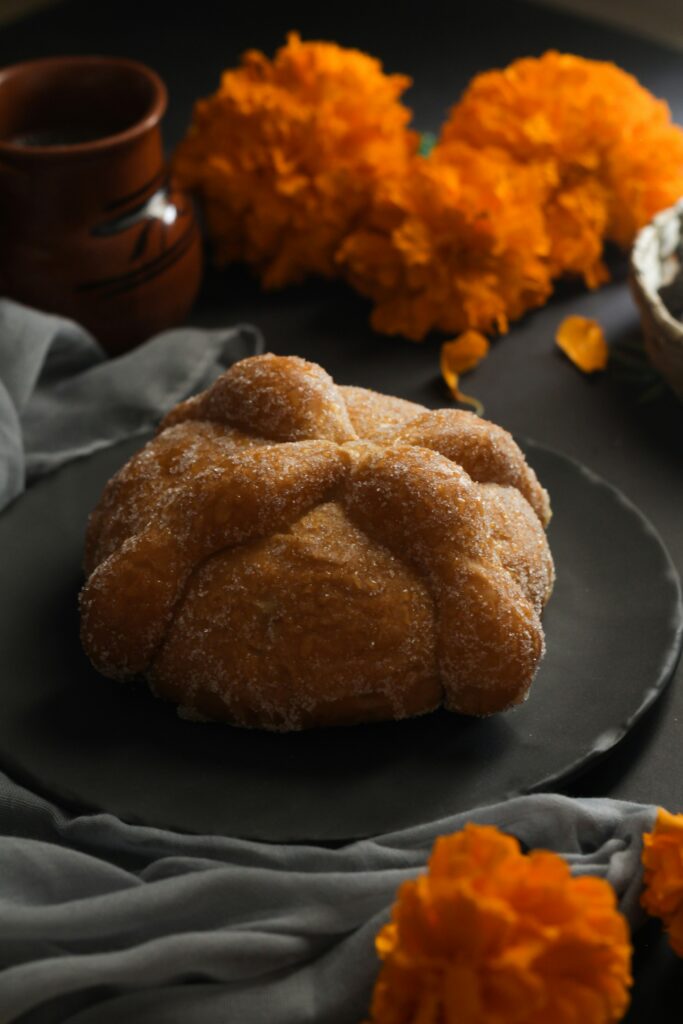19 Apr Spirituality in Food: Macrobiotism
Food’s intertwining with spirituality has existed throughout the ages. From the dawn of societies, food rituals have been performed as symbolic acts of reverence, celebration, or connection to the divine.
In Greek mythology, people would make food offerings to the gods to honor and appease them. In Norse mythology, warriors who died in battle were believed to be taken to Valhalla, a great hall where they would feast with the gods. In Egyptian mythology, it was believed that the deceased would continue to exist in another realm. Therefore, food offerings, known as “funerary offerings,” were placed in tombs to sustain the spirits of the dead on their journey to the afterlife. Even in his time, Confucious had philosophies on food and shared his recommendations on the subject.

Nowadays, many countries have specific holidays when food rituals and traditions are at the center of the celebration. A well-known example is the Mexican Dia de Muertos (Day of the Dead) which has equivalent holidays in various cultures, some of which are usually around the same time – the end of October or the beginning of November.
On the left, you can see Pan de Muerto (in English: Bread of the Dead) which is a traditional part of the Mexican celebration.
Can you think of any other examples?
Overall, spirituality in food has shown up through various practices, some of which seem quite outdated in modern-day life. Unfortunately, this means that many people have lost that specific connection to the divine and food has been stripped down to its physical purpose – sustenance for our physical bodies.
However, our physical bodies and our spiritual bodies are two sides of the same coin.
In recent years, there has been a lot of scientific research on the way that stress and trauma show up through maladies. Unresolved issues with others or oneself can manifest in the body. While conventional healing methods such as exercise, therapy, support groups, mindfulness, meditation, and journaling offer immense benefits, there exists an alternative approach deeply rooted in our fundamental human experience.
Healing should begin with the basics and, specifically, food.
The food that we consume is parallel to not only our physical but also our spiritual wellness. Life is energy. Our body is energy. Food is energy. Those energies constantly interact with each other, and constantly shift and change themselves through those interactions. Therefore, we must choose wisely what we consume. This philosophy of life was introduced a long time ago through ancient Chinese medicine. It was brought back to light by German physician and writer Christoph Hufeland at the end of the 18th century, and later inspired Japanese author George Ohsawa to find the Macrobiotic diet, or as I will be referring to it – Macrobiotism.
The word macrobiotic comes from “macro” which means big and “bios” which means “life”. So, the macrobiotic diet is considered a lifestyle, and can be also called the art of a great life. Macrobiotism is about fostering a deeper connection to oneself, others, and the natural world through mindful eating, balanced nutrition, and a holistic approach to wellness.
According to traditional Chinese culture, the circulating life force that everything is comprised of is called “ki.” Ki is in turn a combination of two complementary energies – yin and yang, or respectively female and male, dark and light, passive and active, earth and air. Ohsawa took this principle and turned it around considering more physical characteristics. In Macrobiotism, all foods, diseases, and even cooking utensils either lean towards one of the energies or have a more balanced combination of the two.
According to Ohsawa’s definition, yin (female) energy is based around the Sacral chakra (connected to the uterus) and moving upwards, therefore it is considered to be the more expansive and air-related. Yin foods are more light and cooling – grains, fruit, vegetables. More extreme examples would be tropical fruit, sugars, and caffeine. Expansive foods tend to aid our creativity and spirituality but in excess can lead to a lack of motivation, anxiety, and over-sensitivity – very feminine qualities.
To balance yin, yang (male) energy is based around the Crown chakra (connected to the head) and is moving downwards, therefore, it is considered to be more compact, dense, and earth-related. Yang foods are rather heavier and hotter – meat, cheese, eggs. These foods in moderation can bring forward strength, clarity, and focus. When overindulging in them, however, we can notice more extreme masculine traits such as aggressiveness, competitiveness, and frustration.

Some examples considered by macrobiotics to be the foods in which yin and yang are closest to being in balance – brown rice and whole grains such as barley, millet, oats, quinoa, spelt, rye, and teff.
In the context of health, diseases are viewed through the lens of energy imbalances. For instance, Michio Kushi, a disciple of Ohsawa, illustrates this concept by considering the case of hemorrhoids. According to his teachings, hemorrhoids are associated with a dense and heavy energy, characterized as yang. To aid this condition, Kushi suggests rebalancing with foods that possess expansive (yin) qualities.
If you find these concepts a bit unconventional, here are some additional, more orthodox food principles that define the macrobiotic diet:
1. Embrace Local & Seasonal Foods: Make it a priority to enjoy foods that are fresh and in season, supporting both your health and the local community.
2. Opt for Whole & Minimally Processed Foods: Choose foods in their most natural state whenever possible, minimizing processing and preserving their nutritional integrity.
3. Practice Gratitude & Mindfulness: Take time to savor each bite, chewing slowly and mindfully. Cultivate gratitude for the nourishment your food provides.
4. Embrace Variety & Moderation: While a plant-based diet is encouraged, ensure you’re getting all the essential nutrients your body needs. Balance is key to a well-rounded diet.
In my experience, while I don’t strictly adhere to Macrobiotic principles, I recognize the value they bring to our daily practices. While not a one-size-fits-all solution, Macrobiotism stands as a testament to the enduring union of food and spirituality — a connection from which we can all draw nourishment for body and soul.


No Comments